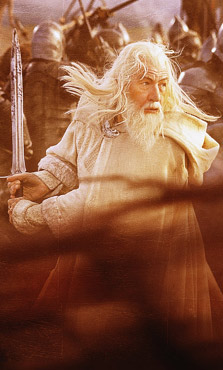 The conclusion of Peter Jackson’s “Lord of the Rings” saga is one of the great last chapters. The ending is almost too mighty; the muscular epic is closed off so thoroughly that the credits arrive like a tender mercy. Jackson gave the trilogy its full, epic breadth without letting it collapse under the weight of its own mythos, as in “The Matrix” sequels. The ensemble acting is competent, the writing strong, but its chief pleasures are visual, Jackson and his crew raising the bar for digital FX. These movies truly give us a complete world. The conclusion of Peter Jackson’s “Lord of the Rings” saga is one of the great last chapters. The ending is almost too mighty; the muscular epic is closed off so thoroughly that the credits arrive like a tender mercy. Jackson gave the trilogy its full, epic breadth without letting it collapse under the weight of its own mythos, as in “The Matrix” sequels. The ensemble acting is competent, the writing strong, but its chief pleasures are visual, Jackson and his crew raising the bar for digital FX. These movies truly give us a complete world.
The film, like the others in this series, has one major drawback, which is its fidelity to the books. It’s hard to criticize the care shown in faithfully cramming in as much from the books as possible, particularly in light of the usual action/fantasty pap that poisons our ‘plexes. Respect for any author is welcome. Nevertheless the story is so big that it isn’t told so much as managed. Jackson is a fine ringmaster, but around the midway point even he can’t keep it together. Jumping about, the film loses momentum. A feeling of exhaustion hits right around the final battle that doesn’t abate during each of the movie’s fourteen laborious endings (and this isn’t even the full director’s cut, to hit theaters later in the year).
The bloating is caused by the many smaller detours —why the useless subplot about the cowardly steward of Gondor?—as well as the larger story arc—why two nearly identical apocalyptic battles spread over two films when one would have sufficed? From Frodo to the barmaid back in the Shire, every character is given his, her, or its due share of the spotlight, as if Jackson were an overprecious teacher trying to be fair to each and every one of the kids in his second-grade Christmas pageant. The narrative tonnage is almost too much to bear, a burden only slightly mitigated by the fact that Jackson’s excesses are misdemeanors of love rather than crimes of self-indulgence. “The Lord of the Rings” will stand as an ambivalent monument to Jackson’s inabilty to stop himself from delivering fatigue and delight in equal measure. |